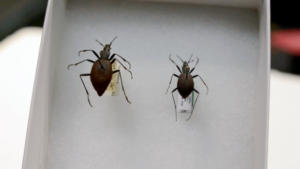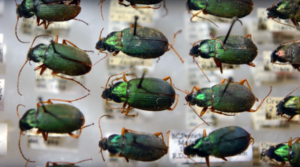Province’s 4 biggest species have shrunk by 20 per cent over past 45 years, research shows

Some of B.C.’s beetles are getting smaller because their habitats are warming up, according to new research from the University of British Columbia.
The study, published in the Journal of Animal Ecology on Tuesday, shows that climate change is having an affect on even the most “teeny tiny” organisms.
A group of students on the study looked at eight species of beetles that were caught in the Okanagan and Lower Mainland over the past 100 years. They compared changes to the bugs’ size to temperature data over the past century.
In all, the researchers examined and photographed more than 6,500 insects for the project.

They found the four biggest species of beetle have shrunk by 20 per cent over the past 45 years. During that time, fall temperatures have risen by 1.6 C in the Lower Mainland and 2.25 C in the Okanagan.
“You can definitely tell that just by eyeballing them,” said Michelle Tseng, assistant professor in botany and zoology at UBC. “It’s pretty substantial.”
Accelerated growth
Hotter weather means less growth for cold-blooded organisms like beetles, said Tseng.
“At warmer temperatures, their metabolism is higher,” she explained. “So they crank through their juvenile life stages really quickly.”
Because they’re flying through their younger years faster, the big bugs don’t have the opportunity to put on weight and end up as smaller adults.
Most evidence of shrinking organisms has come from laboratories, where the environment and living conditions are more controlled.
Tseng, originally an insect ecologist, said the study started when she asked her fourth-year undergraduate students to see if the same thing was happening with specimens collected from the wild.
Nine students stayed on after graduation to finish the work.


